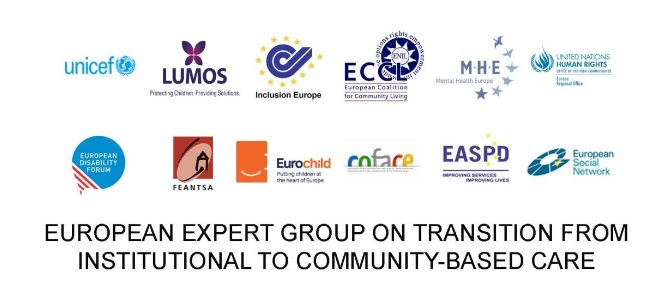The European Commission (EC) recently published its 2016 country-specific recommendations (CSRs) to the Member States. Following positive statements on the way social care and support should be provided in the last few years by the European Commission, the European Expert Group on the Transition from Institutional to Community-Based Care (EEG) welcomes several recommendations promoting quality care and support and access to employment and inclusive education for disadvantaged groups. Nonetheless, the overall focus on austerity will be detrimental to the transition to community-based services in Europe if no safeguards are made available for public investment in this area.
In Europe, millions of children, persons with disabilities, older persons, homeless people and those from other disadvantaged groups live in segregated institutional settings, excluded from mainstream society. Without adequate, person-centered support in the community, that is accessible for all persons and their families, institutionalisation will sadly continue. This violates their right to live independently or to be raised by their family and to have choices and control over their life, just like other people. Since people in segregated institutional settings are usually unable to take part in mainstream education or the open labour market, the economic and societal impact of their exclusion is very high.
The EC’s Annual Growth Survey 2016 fully supported this argument and urged “social infrastructure (to) be provided in a more flexible way, personalized and better integrated to promote the active inclusion of people …”. Its analysis of poverty and social exclusion also argued that “access to high-quality healthcare from an early age is indispensable for people to grow and live healthily and contribute to society.”
The EEG is pleased that several CSRs back the European Commission’s commitment to the transition from institutional to community-based care. The CSR recommendation to Estonia to “ensure the provision and accessibility of high-quality public services, especially social services, at the local level, inter alia by adopting and implementing the proposed local government reform” is a particularly positive step. The same can be said about the CSR calling on Romania to “improve access to integrated public services.”
The EEG, however, remains concerned that these positive social recommendations may not be sufficiently protected and strengthened ahead of recommendations in the area of fiscal consolidation, included in most CSRs. For instance, whilst Spain receives positive CSRs related to a better coordination of regional employment services with social services or to improve family support schemes, including access to quality childcare and long-term care, it also receives a recommendation to “ensure a durable correction of the excessive deficit by 2017, reducing the general government deficit to 3.7% of GDP in 2016 and to 2.5% of GDP in 2017”. It is indispensable to ensure that the fiscal recommendations do not undermine the implementation of the social ones.
Luk Zelderloo, the co-chair of the EEG and secretary-general of the European Association of Service Providers for Persons with Disabilities, argues that “the European Commission must include safeguards for public investment in the area of quality social infrastructure in recommendations related to fiscal consolidation. This would ensure that the European Commission positively contributes to the transition to community-based care, while also staying within the remit of their fiscal agreements.”
The EEG calls on the European Union to continue the fight against segregating institutions and for creating inclusive communities in all its policies and activities, even beyond the use of European Structural and Investment Funds.
Relevant documents















